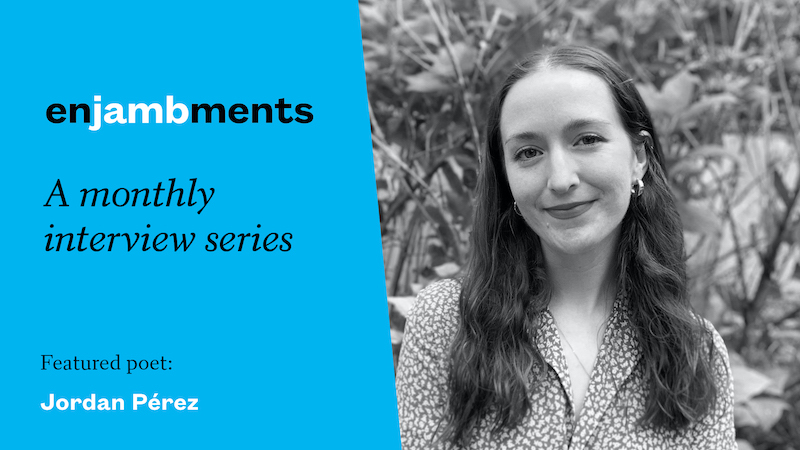
Jordan Pérez published her debut poetry collection, Santa Tarantula (University of Notre Dame Press), in 2024. Her work has appeared in Poetry, Cutthroat, Poetry International, Mississippi Review, and other publications. Pérez also works professionally in childhood sexual abuse prevention.
Poets.org: As the title suggests, Santa Tarantula draws from both the natural world and Christian tropes. It depicts the female’s fight for survival much like that of the animal’s. What drew you to explore violence and femininity in this way—that is, through the women of the Bible and the image of the tarantula?
Jordan Pérez: I’ve drawn this connection between women today, Biblical women, and female animals because I see so many elements that have not changed in hundreds or thousands of years. When you’re perceived by the world as a woman, you most likely have this sense of constant alertness, of mistrusting the motivations of men, of being ready to fight for your survival at any moment. I think that was true of women many, many years ago and has been true for female animals for even longer, and will likely be true of women for quite a while.
It might surprise folks to learn that I’m not actually a tarantula fan. I have never had one as a pet and can’t imagine holding it (I’m scared of spiders). But I put a lot of focus on this particular creature partly because people have such aggression toward it, even though it’s actually not meaning you any harm.
Finally, I feel a kinship to an angry mother bear just as I do to a “harlot” in the Bible. She’s just doing what she can to survive.
Poets.org: In the poem “Knockout Rose,” a young girl “might do anything / for a hint of light on her face.” Light is a recurring motif in this book, acting not only as a symbol of respite but also as a tool with which we bear witness to the pain inflicted both on others and ourselves. How did you handle this careful balance of light’s juxtaposition in this collection?
JP: I think there’s a sense throughout Santa Tarantula that very few people or things can be confidently categorized. Whether that’s people in one’s life or oneself, they aren’t static; they’re continually shifting. Making light a conflicting symbol exacerbates this uncertainty. Sometimes, yes, light is something whole and righteous and universally good—capital G. And sometimes it’s that which carries pain. My resistance to having light function in just one way helps create that atmosphere of change, of not knowing, of being unsure about who and what can be fully trusted.
Poets.org: Part of what makes Santa Tarantula so compelling is your mastery of the poetic line. Could you elaborate on your relationship to this formal aspect and how it anchors the complex emotive content explored in your poems?
JP: My relationship with the poetic line has been such a journey. When I first began writing poetry, I was drawn in by poets who were very free and innovative with the structure and visual aspect of their work. I felt comforted by a sense of freedom and wildness. As I wrote more and began to look for my own voice, I returned gradually to tightness and restraint in form. In one sense, this is because restraint forces me to be purposeful with every character and allows me to feel in control of how I’m telling something. But in another sense, the form contrasts so nicely with many of the themes that my work explores—captivity and restriction, having to be very careful about what one says, what one does, who one is true with.
Poets.org: In “I Consider Violence” the speaker says, “I learn to fill myself with other things: / the julienned light in the bedroom, mouthfuls / of Debussy from the old piano [...].” What role does consumption play in your work?
JP: There are two aspects to this, certainly. There’s this theme of eternal consumption—that is, of women being consumed by societal forces. But there are also the strong perspectives of the various speakers in the collection. Some of the latter is a purposeful upending of the trope of women being consumed by others—letting my women speakers do the consuming themselves. And some of it is because consumption is such a big part of how I experience the natural world. When I see a very pink sunset or a mossy, fallen log, my impulse is to put it in my mouth. I mean, not as an act of violence but as an act of making something part of me, of keeping a memory inside my body.
Poets.org: What are you reading now?
I’ve just started The Leavers by Lisa Ko. I will next read yet another nature book from my To Be Read list: The Home Place: Memoirs of a Colored Man’s Love Affair with Nature by J. Drew Lanham. He’s a Black conservationist and naturalist from the American South. Speaking of the South, I’m always trying to read more writers from here (I’m from Atlanta), so I will turn to the poetry collection Peach State by Adrienne Su soon.
Poets.org: What are your favorite poems on Poets.org?
In no particular order, and if I have to choose just a few: “Orchids Are Sprouting From the Floorboards” by Kaveh Akbar, “The Leash” by Ada Limón, “Pied Beauty” by Gerard Manley Hopkins, “Things You’ve Never Seen” by Fady Joudah, and “Another Elegy” by Jericho Brown.
